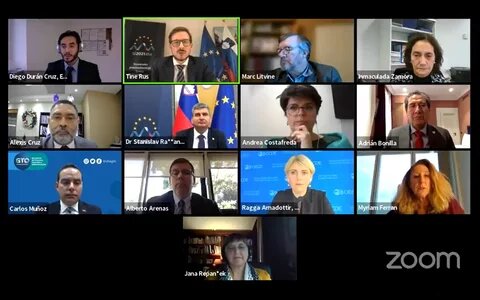On 1 December 2021, members of central institutions from Europe and Latin America and the Caribbean came together in the webinar entitled "The recovery as an opportunity for transformative social change: pathways towards an EU-LAC partnership for cohesive societies", co-organised by the Slovenian EU Council Presidency, the European External Action Service (EEAS), and the Directorate-General for International Partnerships of the European Commission (DG INTPA) in partnership with the EU-LAC Foundation and the OECD Development Centre. The webinar aimed at highlighting the challenges of strengthening social cohesion in the post-COVID-19 recovery, and at discussing ways forward for the partnership between the EU and LAC region to address them.
The crisis of COVID-19 has shed new light on structural social and economic problems and pre-existing vulnerabilities in Latin America and the Caribbean (LAC). The pandemic pushed 4.7 million people into vulnerability or poverty in the region last year. Similarly, the informal sector, in which half of the workers in LAC are employed, has further increased. Moreover, the gap between extreme wealth and severe poverty and vulnerability that characterises the region has deepened even further, which impedes progress towards achieving important goals like the 2030 Agenda and its Sustainable Development Goals.
Inequalities hinder development and lead to a lack of cohesion and societal tensions. This raises the question of how to strengthen social contracts to ensure people’s well-being and citizens’ engagement. The recovery from the pandemic is an opportunity to further strengthen the bi-regional European Union (EU)-LAC partnership in a common search for solutions through peer-to-peer learning and exchanges of experiences.
This event offered a platform for precisely exploring options for multi-sectoral, integrated and participatory partnerships that would support development by facilitating new social contracts to address the structural and systemic challenges facing the LAC region. Dr Stanislav Raščan, State Secretary, acting as Minister for Development Cooperation of the Ministry of Foreign Affairs of Slovenia, and Ms Myriam Ferran, Deputy Director-General of the Directorate-General for International Partnerships from the European Commission, opened the webinar with their welcome remarks agreeing that the post-pandemic recovery implies two things: change – both negative and positive – and opportunity. Change towards modifying our current economic, production, and trade systems and the opportunity to do things better and include what has been neglected, like nature’s needs. Furthermore, Ms Ferran reaffirmed the EU’s strong interest in continuing to support and cooperate with the LAC region.
The event continued with a presentation of the main findings and recommendations of the 2021 Latin American Economic Outlook (OECD/ECLAC/EU/CAF), which feeding into the framework of Development in Transition delved into options for rethinking the social contract and the role to be played by international cooperation. High-level contributions were held by Ms Ragnheiður Elín Árnadóttir, Director of the OECD Development Centre, and Mr Alberto Arenas, Director of Social Development Division of the UN Economic Commission for Latin America and the Caribbean (ECLAC), who shared the view that the pandemic has affected certain societal groups disproportionally with women, informal workers, and children being the most affected. The pandemic has also hit specifically the regions of LAC, Africa, and South-East Asia with a greater need for further actions to strengthen social cohesion.
Furthermore, Mr Marc Litvine, Senior Expert and Head of Sector of the Unit for Central America, the Caribbean and Regional Operations, Directorate-General for International Partnerships of the European Commission, presented the EU’S priorities for 2021-2027 cooperation with LAC on social cohesion, such as are to promote peer learning, combat informality, and create strategic cooperation on equal terms for partners.
High-level panellists from both the EU and LAC came then together to discuss the recovery as an opportunity for transformative social change, around three main angles: challenges to social protection with the focus on vulnerable groups and addressing informality; the key role of fiscal policies; and options for transformative change in relation to more inclusive policy design and partnerships. The panel was moderated by Dr Adrián Bonilla, Executive Director of the EU-LAC Foundation and had the participation of Ms Carmen Marín, Minister of the Management Unit of the Presidency and General Coordinator of the Social Cabinet of Paraguay, Mr Alexis Cruz, Vice Minister of Economic and Social Analysis, Ministry of Economy, Planning and Development, from the Dominican Republic, Mr Philippe Létrilliart, Deputy Director for the Americas of the Ministry for Europe and Foreign Affairs of France, Mr Carlos Fabián Muñoz Tejeda, General Coordinator of Advisors in the Ministry of Finance, Investment and Administration of the Guanajuato State Government, Ms Jana Repanšek, Director of Center of Excellence in Finance of Slovenia, Ms Andrea Costafreda, Programme Director for Latin America and the Caribbean, Oxfam Intermón, and Ms Inmaculada Zamora Martínez, Secretary-General, Ibero-American Foundation for Administration and Public Policies (FIIAPP). The panellists agreed on the need to put people at the centre of the focus of public policies and that knowledge sharing and peer review is crucial to advance good strategic partnerships and promote social cohesion.
Finally, Mr Brian Glynn, Managing Director for the Americas at the European External Action Service, closed the dynamic, valuable, and fruitful exchange in which joint actions for addressing social cohesion were identified and the importance of the strategic partnership for both regions was highlighted. The event was held in the framework of the presidency of Slovenia of the EU Council and the celebration of the 10th anniversary of the EU-LAC Foundation.
